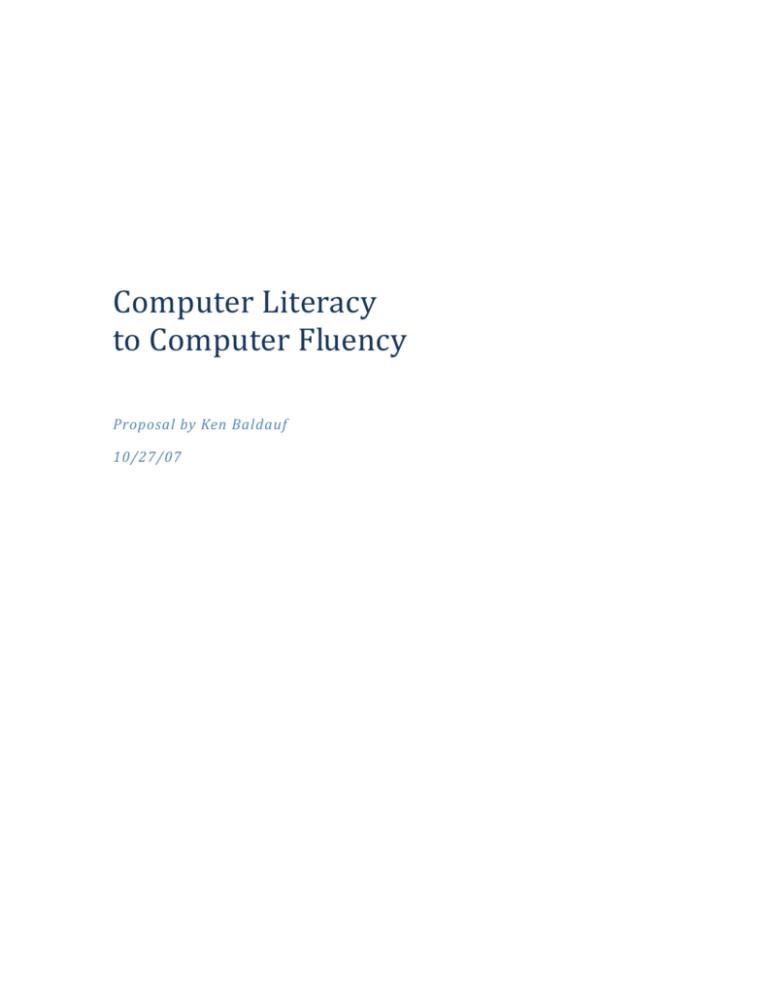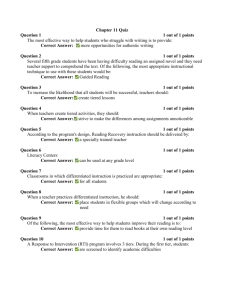CGS2060 Computer Fluency
advertisement

Computer Literacy to Computer Fluency Proposal by Ken Baldauf 10/27/07 Background This proposal affects the following FSU courses: CGS2060, Computer Literacy CGS2060, Computer Literacy Online CGS2060, Computer Literacy for Mac CGS2060, Computer Literacy for Mac Online CGS2100, MicroApps for Business and Economics CGS2100, MicroApps for Business and Economics Online CGS2064, Computer Literacy II CGS2064, Computer Literacy II Online I supervise and teach all of these courses with the exception of the CGS2100 lecture. Forty-two teaching assistants are assigned to assist me. The combined enrollment of these courses in Fall 2007 is 2,734 students. Introduction Over the course of ten years teaching Computer Literacy at FSU I have expanded the program to address a variety of student needs. In the past two years I have experimented and pushed to grow this program by developing courses that address student’s unique interests such as Computer Literacy for Mac, Computer Literacy II, Digital Media, Information Security, and online offerings. Throughout the process these courses have attracted record amounts of students, but have become extremely complex to manage; I am currently producing and maintaining Web sites, content, and materials for eight courses or versions of courses, and managing teaching assistants divided into eleven different job classifications including recitation instructors, online instructors, graders, and test administrators for my four courses. Obviously this volume of students and teaching assistants, and the complexity of the management of so many courses is more than one, or even two faculty members can easily manage. One Possible Solution: Simplification One possible and attractive solution is to combine all of these courses into one course that is midway between CGS2060 Computer Literacy, and CGS2064 Computer Literacy II, in difficulty, and provides a flexible curriculum that could meet the needs of students currently enrolled in CGS2060, CGS2100, and CGS2064. This new course would utilize the CGS2060 course number, but would have a new name: Computer Fluency. The course would be offered in the classroom or online (for on-campus students), although the difference between the two would be negligible – one lecture class each week that online students would be welcome to attend. I am uncertain that the FSU College of Business, and State University System would approve of merging CGS2100 with CGS2060 and accepting CGS2060 for its requirement. If not, combining CGS2060 and CGS2064, without CGS2100 still offers a valuable streamlining of our courses. The new and improved CGS2060 will be very similar to CGS2100, with added benefits for students. The timing for an evolution of Computer Literacy is ideal for a number of reasons: 1) students are coming in to college with many skills taught in CGS2060, it is time to increase the rigor of this course, 2) my experience teaching a number of experimental computer courses is ideal for creating the perfect CGS2060 curriculum, 3) budget cuts are requiring us to do more with less. CGS2060 Classes CGS2060 Computer Fluency will provide 75 minute weekly lectures in large lecture halls to accommodate 1,500 classroom students (500 more seats than currently offered in classroom offerings of CGS2060, CGS2100 and CGS2064 combined). An online version of the course would also be provided that would require no regular class meetings. If possible, recitation classes for classroom students, which currently serve as help sessions and testing sessions could be replaced with online support and instruction, and an open help lab, and testing center. I am unsure of whether the University would find this acceptable in terms of contact hours. Lectures would feature discussions on current technologies, and issues surrounding those technologies. Lectures would be required for classroom students and open to online students. The goal of lectures will be to engage students in discussion on interesting technology-related topics (of which there is no shortage), to prepare students for technologies used in the work place with which they are not familiar, and to provide students with hands-on assignments and a framework for each assignment that illustrates the problem-solving nature of the task. Special guest speakers will be arranged to provide insight on particular topics. Here are a few examples of lecture topics: Processing power: as we approach processing speeds that will provide computers with the capacity to think like people, should we be concerned? State of technology in hardware: What considerations are required for the purchase of a new computer or cell phone. What types of computers and systems are used in businesses and organizations? Software and information systems: What type of software is available to assist students, and what type of software and information systems will students be using in the businesses they will join upon graduation? Internet and globalization: How is the Internet enabling individuals, businesses, and organizations? What is globalization? How can students prepare for work in the Internet-connected global business environment? Information security: How vulnerable are information systems owned by individuals, businesses, and governments? What safeguards are available and what steps can be taken to protect our information and information systems? Ethical and social considerations: What new ethical and social challenges does our digital world provide? What can you do to impact the digital world in a positive way? CGS2060 Assignments Assignments will be provided in several areas going beyond the traditional Computer Literacy curriculum. Some assignments will be mandatory and required of all students (in order to comply with the original course description, and computer literacy requirements). Others will allow students to select from several choices. Students may work on assignments using any platform: Windows, Mac, or Open Source. However, Office applications will be graded and tested using Microsoft Office 2007 on Windows. Students working on different platforms will be able to save their work as Microsoft Office documents for grading. Assignments topics may include: Mandatory o Online research and Word Processing o Spreadsheet Software o Online Personal Information Management (PIM) software such as managing contacts, calendars, to-do lists, and shared documents o Database Software (mandatory for business majors only) Choices – select two o Presentation Software o Web 2.0 online services: social networking, social bookmarking, wikis, and media sharing o Digital Photography and Photo Editing o Media Production (video, audio) o Web Development CGS2060 Help Desk and Help Center Assistance with assignments will be available through our Help Desk and Help Center. Graduate Student teaching assistants will be on call 40 hours a week to answer email, phone calls, and online discussion group questions. Also a computer classroom (one that we currently use for recitation classes) will be staffed to assist students with assignment questions either on campus PCs or the student’s own notebook, 40 hours per week. CGS2060 Exams CGS2060 Computer Fluency students would take exams on lecture topics as well as on the mandatory assignment skills. An exam will be required for basic operating system manipulation and file management in Windows – in keeping with FSU’s defined computer competency requirements. Students will also take online or in-lecture quizzes covering chapter readings. Tests will be scheduled for outside of class time and be provided by teaching assistants. CGS2060 Administration Two faculty members will manage the expected 3,000 students, half of which will be online and half in the classroom. One faculty member will mange the online portion of the class, and provide activities to give students an interactive online experience. The other faculty member will provide the weekly lectures and manages the classroom students. The faculty members will work together to supervise the teaching assistants. Benefits to Students CGS2060 Computer Fluency will elevate the rigor of the course, while engaging students with topics and assignments that they will find interesting and relevant. The new course will provide more flexibility to meet the needs of a variety of majors. In developing CGS2064 three years ago, it was my hope that students would take both CGS2060 and CGS2064 to gain a complete education in information technology. While CGS2064 has been popular, it is not getting the enrollment that we had hoped for. By combing the materials from both courses into CGS2060, we will be able to better equip a larger number of students with the tools and understanding necessary to address the technology challenges that they will face in their careers and in life. Topics traditionally taught in CGS2100 dealing with information systems used in businesses and organizations, have become important for students in all majors since they are used in all professions. Over time, as I have gradually introduced these topics into CGS2060, the two courses, CGS2060 and CGS2100, have become very similar. I will cover all the topics in CGS2100 in the new CGS2060 to satisfy the needs of business students and all students entering the job market. The streamlining of Computer Literacy will provide a one-course solution to all students and eliminate confusion over which course to take. The simplicity of the management of my team will allow us to better address student’s needs, provide a more professional service to students, with less opportunity for error, mistakes, or tasks falling through the cracks. Students will find it easier to get one-on-one assistance with problems. Benefits to Myself, the CS Department, and the College of Arts and Sciences Offering one “mega” course rather than several special interest courses will vastly simplify the management of these courses. Consider the organization transformation below: Current TA Positions 1. CGS2060/2100 Recitation Instructors 2. CGS2060/2100 Online Instructors 3. CGS2060/2100 Graders 4. CGS2060/2100 Testers 5. CGS2060 Mac Recitation Instructors Future TA Positions 1. CGS2060 Help Desk Staff 2. CGS2060 Graders 3. CGS2060 Testers 4. Administrative Assistants 5. CGS2060 Recitation Instructors (if needed) 6. CGS2060 Mac Graders 7. CGS2060 Mac Testers 8. CGS2064 Recitation Instructors 9. CGS2064 Online Instructors 10. CGS2064 Testers 11. CGS2064 Graders Conclusion There are several issues to be worked out with this plan before moving on to the design stage. 1. Is it possible to change the name and description of CGS2060 and stay within the requirements of the common course numbering system? 2. Will the College of Business and the State University System accept CGS2060 in place of CGS2100 for its majors, if CGS2060 provides the coverage of material required of CGS2100. If yes, then CGS2100 can be rolled into the new CGS2060. If no, then CGS2100 can either stay as it is, or evolve in parallel with CGS2060. 3. Will the University approve of a three credit hour course that has only one 75-minute lecture each week, but includes online contact hours? 4. Will we be able to acquire large 500 seat or more, lecture halls to be used for CGS2060? 5. If recitation classes are not required, will we be able to use an FSU computer classroom, such as the ones that we have been using for recitation classes as a Help Center and Testing Center. Currently CGS2060 and CGS2100 are the only classes using 302 and 304 MCH Computer Classrooms. Might we continue to use that real estate making one room a help center and one room a testing center? The answers to these questions will provide the details necessary to begin planning. Certainly not all of the ideas in this proposal need to be implemented. Merging CGS2060 and CGS2064 alone will be a great help in reducing the complexity and overhead in managing these courses. To continue with all of these courses without any change beyond the Spring of 2008 will be difficult if not impossible.







